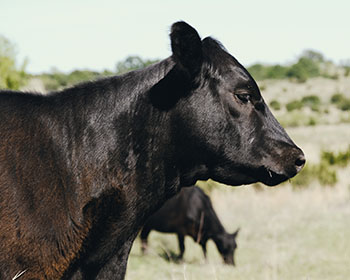UTIA Researchers Study Feed Efficiency of Pregnant Angus Heifers
Nov 07, 2022

While cattle production has historically focused on increasing the feed efficiency of steers to produce a marketable beef product, researchers at the University of Tennessee Institute of Agriculture are studying the feed efficiency of heifers, whose health and pregnancies set production up for success.
Funded by the Tennessee Beef Promotion Board, the research is led by Phillip Myer, associate professor in the Department of Animal Science, who specializes in microbiology of the four-chambered stomach of grazing animals. Gabbi Martin, a graduate student in the Department of Animal Science, is working with Myer. The team is examining the nutritional physiological changes that occur during pregnancy, the impact those changes have on the rumen (stomach) environment, and the resulting feed efficiency in Angus heifers. The information will allow beef producers to modify strategies to improve overall sustainability of heifers and their calves.
“Ideally, the cow is a long-term constituent of a herd, and it is important to examine the rumen environment to improve the cow-calf enterprise,” says Myer. “This work is important for determining the rumen microbial changes that occur in heifers during pregnancy and their impact on nutrition and feed efficiency.”
For producers, it’s optimal to have cows that can produce efficient calves while maintaining a stable, efficient rumen through all stages of production, including pregnancy. To achieve this, Myer and his team are looking at the changes occurring within the rumen environment and determining the impact those changes have on the host. This information will improve the sustainability of the cow-calf enterprise.
“I am excited about the current and future implications of this work in context of production and promotion of high-quality beef for the producers of Tennessee,” says Martin, who is a fifth-generation agriculturalist.
Research for the project titled “Pregnancy influences on the feed efficiency and rumen environment of Angus heifers in producing a quality beef product” began in October 2021 and is being conducted at the East Tennessee AgResearch and Education Center near Knoxville and the Plateau AgResearch and Education Center in Crossville. Since the project’s start, the team has produced one publication that details several potential biomarkers of feed efficiency in both low- and high-feed-efficient heifers. Additionally, the research team found correlations between rumen bacteria and metabolites found in the rumen fluid.
More publications are expected to follow.